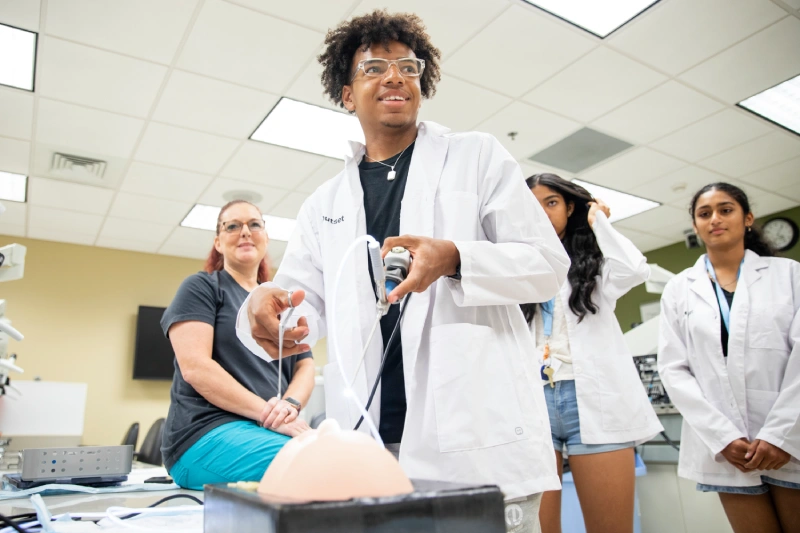Medicine isn't just a career—it's a journey packed with challenges and rewards that last a lifetime. If you're a teenager pondering the question, "Do I have what it takes to be a doctor?", it's essential to delve deep into what this profession truly entails.
From the traits that make a great doctor—empathy, resilience, and a lifelong love of learning—to the practical challenges you'll face, such as long hours and emotional highs and lows, there's a lot to consider. Being prepared for the rigorous demands of the job, including balancing your well-being with professional responsibilities, is crucial.
Understanding the Commitment
Choosing a career in medicine is not a decision to be taken lightly. It requires a significant investment of time, energy, and resources. Medical school programs typically involve a four-year commitment, followed by residency programs that can range from three to seven years, depending on your chosen specialty. According to the Association of American Medical Colleges (AAMC), the average medical student graduates with substantial debt, highlighting the financial considerations of this path.
Furthermore, the journey doesn't end with obtaining your medical degree. Medicine is a constantly evolving field, and staying current requires continuous education. New technologies, treatments, and discoveries mean doctors must be lifelong learners.
Key Traits of a Successful Doctor
The Association of American Medical Colleges (AAMC) recommends that medical students possess a broad range of competencies to effectively learn and develop in medical school and become successful physicians. The premed competency model serves as a roadmap for students as they prepare to succeed in medical school.
Commitment to Learning and Growth
A strong commitment to learning and growth is essential in medicine. Doctors must continuously expand their knowledge, from understanding complex medical concepts to staying current with the latest research. Maintaining a passion for learning not only enhances patient care but also supports professional development. Success in medicine requires effective study habits, time management, and the ability to absorb and apply large amounts of information.
Cultural Awareness and Cultural Humility
Understanding the diverse backgrounds, beliefs, and values of patients is crucial in providing compassionate and effective care. Cultural awareness helps doctors recognize how sociocultural, political, and economic factors influence health, while cultural humility allows for an openness to learning and engaging with diverse perspectives. This fosters a respectful, inclusive environment that supports better patient outcomes and builds trust.
Empathy and Compassion
Empathy and compassion are foundational to the doctor-patient relationship. Recognizing and understanding patients’ emotions, experiences, and perspectives builds trust and encourages adherence to treatment plans. A compassionate approach improves patient satisfaction and contributes to overall well-being. Demonstrating sensitivity to patients’ needs, while offering comfort and understanding, is essential in creating positive healthcare experiences.
Ethical Responsibility to Self and Others
Doctors must adhere to ethical principles in their practice, balancing integrity with professional obligations. This includes making decisions based on a clear understanding of conflicting values, adhering to ethical standards, and fostering an environment of honesty and accountability. Ethical behavior ensures trustworthiness, patient safety, and promotes a positive reputation in the medical community.
Interpersonal Skills and Oral Communication
Doctors must possess strong interpersonal skills, including the ability to engage with patients, families, and colleagues effectively. Clear, empathetic communication helps doctors explain complex medical information in an accessible way, leading to better patient understanding and adherence. Additionally, being skilled at listening actively and responding appropriately to others’ concerns is essential for building trust and fostering cooperation within medical teams.
Reliability and Dependability
Reliability and dependability are essential traits for any doctor. Being accountable for one’s responsibilities, fulfilling obligations in a timely manner, and prioritizing patient care ensures high standards of medical practice. Maintaining a consistent and dependable approach builds trust within the healthcare environment and ensures that patients receive the best possible care.
Resilience and Adaptability
The ability to adapt and persevere through challenging situations is key in medicine. Doctors must navigate high-pressure environments, changing patient conditions, and unexpected obstacles while maintaining mental and emotional well-being. Resilience allows doctors to handle the emotional toll of the profession, while adaptability enables them to adjust to new information, evolving patient needs, and technological advancements.
Service Orientation and Teamwork
A strong service orientation drives doctors to make meaningful contributions to the health and well-being of individuals and communities. Working collaboratively within healthcare teams ensures better patient care and outcomes. Doctors must be able to prioritize shared goals, communicate effectively with other professionals, and adjust their role based on expertise and team dynamics. Collaboration is essential to providing comprehensive care and improving overall health systems.
Human Behavior and Living Systems
Understanding human behavior and the biological systems that influence health is fundamental in medical practice. Doctors must apply knowledge of psychological, sociocultural, and biological factors to diagnose and treat patients effectively. Additionally, an understanding of living systems—molecular, cellular, and organ-level processes—is crucial for advancing treatment and ensuring patients’ well-being.
Critical Thinking and Quantitative Reasoning
Doctors must apply critical thinking to assess problems, analyze evidence, and make informed decisions. Critical thinking enables clear decision-making, even under pressure, while quantitative reasoning supports the ability to analyze medical data and apply it to real-world scenarios. A study in the National Center for Biotechnology Information (NCBI) emphasizes the importance of critical thinking in clinical decision-making. Together, these skills ensure accurate diagnoses and effective treatments that lead to improved patient outcomes.
Scientific Inquiry and Written Communication
Doctors must be adept in scientific inquiry, using research and evidence-based practices to inform patient care. Understanding the scientific process allows for the integration and application of knowledge in clinical settings. Additionally, effective written communication is necessary for documenting patient information, writing reports, and sharing knowledge with other healthcare professionals. Clear, precise communication ensures continuity of care and contributes to medical advancements.
Challenges in the Medical Profession
Doctors face intense physical and emotional demands, with administrative burdens being a major challenge. Paperwork, shifting insurance policies, and evolving technologies consume valuable time that could be spent with patients. These tasks are among the leading causes of physician burnout.
The emotional weight of caring for others can lead to fatigue. Sadly, many physicians hesitate to seek mental health support due to fears about their professional standing. Stigma around mental health persists in the medical community, discouraging doctors from getting help. Balancing work and life isn't easy either; long hours and heavy caseloads often squeeze out personal time, affecting relationships and overall well-being.
The field requires you to be adaptable, as treatments and technologies evolve quickly. Keeping up is essential but can feel overwhelming. Subscribing to medical journals, attending conferences, and participating in continuing medical education are ways to stay current. The Accreditation Council for Continuing Medical Education (ACCME) sets standards for ongoing education to ensure physicians remain competent throughout their careers.
Overcoming these hurdles means prioritizing self-care, leaning on peers, and fostering a work environment that values well-being. Institutions increasingly recognize the importance of physician wellness programs that aim to reduce burnout and improve job satisfaction among healthcare providers.
Assessing Your Fit: Do I Have What It Takes to Be a Doctor?
Wondering if medicine is right for you? Start by getting some firsthand experience. Shadowing a doctor lets you see up close what patient care is really like—the highs and the lows. These experiences illustrate the benefits of medical training programs in preparing you for a career in medicine.
Shadowing can provide invaluable insights into the day-to-day responsibilities of physicians. Many students also join medical summer programs that offer surgical workshops, clinical diagnostics, and emergency simulations. If you're considering this path, preparing for a medical summer program is key.
Volunteering at hospitals or clinics lets you give back to your community while gaining firsthand experience in patient care and teamwork. It helps you develop essential skills like empathy and communication by interacting with patients and healthcare professionals.
Attending workshops and seminars can also connect you with mentors and keep you informed about advancements in medicine. Building relationships with experienced doctors provides valuable guidance and support as you explore your career path.
Making an Informed Decision
Making the decision to pursue medicine requires some soul-searching. You need to assess your communication skills, empathy, and ability to solve problems under pressure.
Think about the activities that can help you build relevant skills—volunteering, shadowing, community service. These experiences offer essential insights into whether medicine is the right path for you. Self-reflection is crucial; consider whether the lifestyle and commitments align with your personal goals and values.
There's nothing quite like real-world exposure to show you what medicine is really about. Programs like Outset let you dive into healthcare headfirst, taking you beyond the classroom and into the thick of it. This experience doesn't just build essential skills for pre-med students—it helps you answer the question, "Do I have what it takes to be a doctor?" and figure out if you're ready for the demanding world of medicine.









.jpg)




.png)








